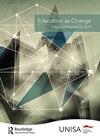Using Critical Policy Historiography in Education Policy Analysis: A South African Case Study
IF 1
4区 教育学
Q3 EDUCATION & EDUCATIONAL RESEARCH
引用次数: 0
Abstract
This article foregrounds the value of using “critical policy historiography” as an analytical/methodological tool in undertaking policy formulation research, highlighting the importance of taking a long-term historical perspective. Using school-funding policies in South Africa as a case study, it argues that while there was wide consultation with stakeholders, power dynamics within the policymaking process underscore the influence of policy elites, such as experts and powerful lobby groups, in shaping policy outcomes. In particular, it critiques the foundational moment of school-funding policymaking in the democratic era, that is, the South African Schools Act of 1996, focusing on key actors that shaped the Act, and whose interests were ultimately served. The article then reviews changes made to school-funding policies to date, and, building on the work of Salim Vally and others, argues for a policymaking framework that strengthens the influence of poor and marginalised communities on policy outcomes if the education social justice project in South Africa is to be advanced.批判政策史学在教育政策分析中的应用:南非个案研究
本文强调了在进行政策制定研究时,使用“批判性政策史学”作为分析/方法论工具的价值,强调了从长期历史角度看待问题的重要性。以南非的学校资助政策为例,它认为,尽管与利益攸关方进行了广泛协商,但决策过程中的权力动态突显了专家和强大游说团体等政策精英在形成政策结果方面的影响力。特别是,它批评了民主时代学校资助政策制定的基础时刻,即1996年的《南非学校法》,重点关注塑造该法案的关键行为者,以及他们的利益最终得到了服务。然后,这篇文章回顾了迄今为止学校资助政策的变化,并在Salim Vally等人的工作基础上,提出了一个政策制定框架,如果要推进南非的教育社会正义项目,该框架将加强贫困和边缘化社区对政策结果的影响。
本文章由计算机程序翻译,如有差异,请以英文原文为准。
求助全文
约1分钟内获得全文
求助全文
来源期刊

Education As Change
EDUCATION & EDUCATIONAL RESEARCH-
CiteScore
1.40
自引率
0.00%
发文量
29
审稿时长
24 weeks
期刊介绍:
Education as Change is an accredited, peer reviewed scholarly online journal that publishes original articles reflecting critically on issues of equality in education and on the ways in which educational practices contribute to transformation in non-formal, formal and informal contexts. Critique, mainly understood in the tradition of critical pedagogies, is a constructive process which contributes towards a better world. Contributions from and about marginalised communities and from different knowledge traditions are encouraged. The articles could draw on any rigorous research methodology, as well as transdisciplinary approaches. Research of a very specialised or technical nature should be framed within relevant discourses. While specialised kinds of research are encouraged, authors are expected to write for a broader audience of educational researchers and practitioners without losing conceptual and theoretical depth and rigour. All sectors of education are covered in the journal. These include primary, secondary and tertiary education, adult education, worker education, educational policy and teacher education.
 求助内容:
求助内容: 应助结果提醒方式:
应助结果提醒方式:


